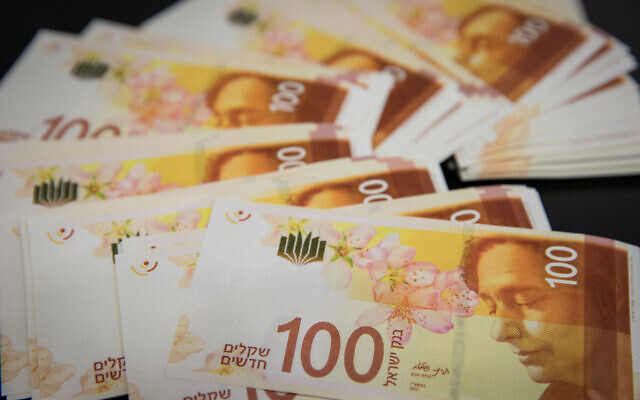The shekel’s stubborn refusal to weaken is troubling the Bank of Israel, prompting governor Amir Yaron to signal this week that the central bank may increase its purchase of foreign currency beyond the $30 billion it already pledged to buy this year in hopes of curbing the Israeli currency’s strength.
On January 14, the central bank made a rare announcement about the scope of its foreign exchange purchases for 2021 in order to provide the market with certainty about its commitment to keep the appreciation of the shekel against the greenback in check.
The shekel advanced some 7.5% against the dollar in 2020, buoyed by the resilient tech sector, an inflow of foreign cash and strong bond purchases, as well as the pandemic-weakened dollar. But the stronger shekel has badly hurt Israeli exports, putting pressure on the central bank to rein in the exchange rate.
The central bank announcement had its effect, pushing the exchange rate to NIS 3.30 to the dollar from a 25-year low of NIS 3.11. The dollar is now trading around NIS 3.25, even after the central bank bought $6.8 billion worth of foreign currency in January, bringing its foreign exchange reserves at month’s end to $179.5 billion, or some 45% of the nation’s GDP.
“Thirty billion dollars is a considerable amount,” Yaron said at an event at Bar-Ilan University on Sunday evening, according to a statement released by the Bank of Israel on Monday. “We are committed to spending this amount. To understand the magnitude, consider what would happen in the foreign exchange market if the surplus in the current account would decrease by such an amount,” he said.
“Of course, if it will be relevant, and given the economic and market conditions at the time, we can increase the scope of the foreign exchange purchase program.”

Illustrative image 100 Israeli Shekel bill; December 31, 2017 (Nati Shohat/Flash90)
In recent months, foreign currency flows into Israel’s economy have intensified, against the background of the growth of the current account surplus, direct investments, large-scale foreign currency sales by institutional investors hedging investment portfolio profits in capital markets abroad, and a considerable reduction in real investments by Israelis offshore.
“Having made a commitment to buying $30 billion in 2021, the Bank of Israel has already bought almost $7 billion in the month of January alone. The market may question whether $30 billion is sufficient,” said Daniel Hass, who heads market strategy and advisory services at the Bank Hapoalim OTC Trading room, in a phone interview.
Since December, the central bank’s published data shows it has bought some $12 billion in foreign currencies at market. “But the dollar-shekel exchange rate is actually lower now than we were on December 1,” said Hass. On that date the rate was NIS 3.28-3.29 to the dollar, “and we are now NIS 3.25. Effectively, the $12 billion, which is more than 30% of what they would be buying this year, has had limited overall impact.”
He said Yaron had “make it clear that the $30 billion is open-ended,” and was likely attempting to further alleviate market jitters.
Announcing the plan to buy $30 billion this year was a “very bold and significant step by the bank of Israel,” which triggered an immediate response from the market, the British-born Hass said. “You can give Bank of Israel a lot of kudos and credit, but ultimately, they are fighting gravity.”
Hass noted that the bank had other tools to curb the shekel, including lowering the lending rate to zero or negative, though such a move is unlikely.
The central bank could also set out “macro-prudential measures. “This would mean possible capital controls and restrictions and demands on foreign currency speculator transactions, though “this would also be very unlikely,” Hass said.
The last option would be for the central bank to continue with even more aggressive market intervention. “They could come out with more statements of intent, verbal intervention, or they could come and buy another $20 billion in February and March. It is a central bank, they can pretty much do what they like,” he said.
During the course of the fourth quarter of 2020, the shekel strengthened by approximately 6.6% percent against the dollar, the Bank of Israel said on Wednesday. In parallel, the shekel strengthened by about 2% percent against the euro.
Israeli institutional investors (pension funds, provident funds, and insurance companies) had net sales of foreign exchange totaling about $5.2 billion in the fourth quarter of 2020, and nonresidents increased net foreign exchange sales to about $6.2 billion. In contrast, the business sector continued its net purchases of foreign currency, totaling about $1.8 billion in the fourth quarter, the central bank said.
https://www.timesofisrael.com/central-bank-may-go-beyond-30-billion-forex-buy-to-tame-mighty-shekel/
2021-02-11 14:11:06Z
CBMiZGh0dHBzOi8vd3d3LnRpbWVzb2Zpc3JhZWwuY29tL2NlbnRyYWwtYmFuay1tYXktZ28tYmV5b25kLTMwLWJpbGxpb24tZm9yZXgtYnV5LXRvLXRhbWUtbWlnaHR5LXNoZWtlbC_SAQA
Bagikan Berita Ini














0 Response to "Central bank may go beyond $30 billion forex buy to tame mighty shekel - The Times of Israel"
Post a Comment